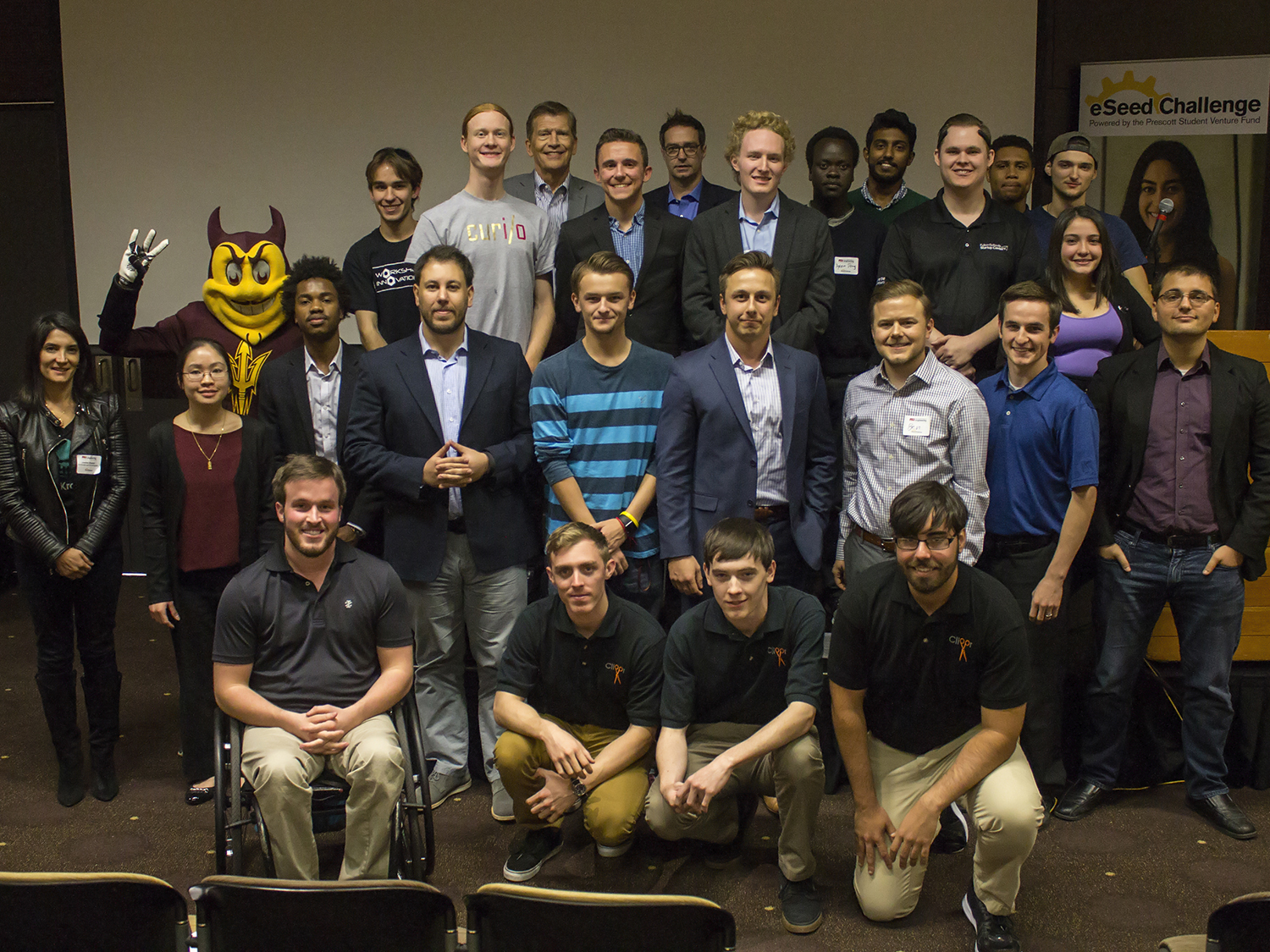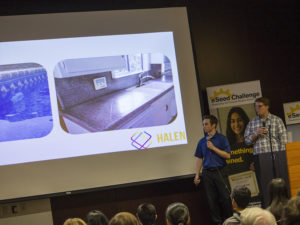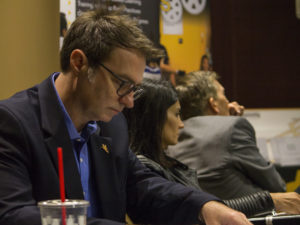
Entrepreneurship in engineering has a strong showing at eSeed Demo Day

The second cohort of student-led ventures from the eSeed Challenge + Accelerator pose for a photo with event judges at eSeed Demo Day, November 30, 2016 at ASU’s Memorial Union on the Tempe campus. Photographer: Marco-Alexis Chaira/ASU
The second cohort of student startups in the eSeed Challenge + Accelerator competed for additional funding going into the next stage of the entrepreneurship competition at eSeed Demo Day, November 30, 2016.
Open to all Arizona State University students with an idea to launch a service or product, the competition is organized by the Ira A. Fulton Schools of Engineering and develops student-led ventures, providing them with mentoring and guidance. Now in its second year, the eSeed Challenge kicked off in August when 39 ventures entered the program and were each granted $1,000 to validate or reject their business model hypotheses. Thirty of the ventures moved onto to Pitch Playoffs in early November, which halved the competitors.
The 15 remaining ventures at eSeed Demo Day each gave a five-minute presentation, outlining their product or service, business model and made their case for funding.
After each presentation, the student entrepreneurs fielded questions from a panel of judges, which included Assistant Professor of biomedical engineering Jamie Tyler, also the cofounder and chief science officer of Thync; Lawdan Shojaee, co-founder and CEO of Axosoft; along with Matt Likens, the founder and former CEO of Ulthera. Likens also opened the event with a keynote speech, dolling out advice to the young entrepreneurs and emphasizing the importance of maintaining an entrepreneurial mindset.
Following some deliberation, the judges broke the ventures into three evenly distributed groups. The bottom five teams continued in the program but did not receive additional funding, the middle group advanced with $5,000 and the top five teams received $5,000 and earned a trip to Silicon Valley.
The top teams are called the Prescott Fellows in honor of Tom Prescott, ASU civil engineering alumnus, former president and CEO of Align Technology Inc. and the eSeed Challenge’s lead benefactor. They will travel to Silicon Valley to meet with top-level professionals, tour startup companies and have an opportunity to pitch to successful entrepreneurs.
The top ventures selected were:
- Halen, a company that leverages Internet of Things technology to develop pool sensors to detect drowning and alert homeowners through a mobile app. The team is led by software engineering student Kevin Hale and manufacturing engineering student Grayson Allen.

Software engineering student Kevin Hale, left, and manufacturing engineering student Grayson Allen pitch their startup, Halen, to a panel of judges at eSeed Demo Day, November 30, 2016. Their company aims to use the Internet of Things to develop pool sensors to detect drowning and alert homeowners through a mobile app. Photographer: Marco-Alexis Chaira/ASU
- JustForMe, a fashion company that allows women to customize a bra using modular pieces to fit them better, led by Jessica Maschino, a chemical engineering and exploration systems design student, and Joel Guy, a sustainability student.
- AmbulAid is intent on bringing an affordable, efficient and easy-to-use mechanical medical device to market which will aid the neurologically disabled in their recovery efforts by facilitating a form of therapy otherwise only achieved with very expensive robotic machinery. AmbulAid is led by Daniel Campbell, an engineering student focusing on robotics, and Kelly Allegro, a doctor of physical therapy.
- AirGarage is headed by computer science student Scott Fitsimones and physics student Jonathon Barkl. Their web marketplace connects neighborhoods and businesses to users in search of long-term, affordable parking.
- DocBot is a company that’s devoted to developing AI-driven software to improve clinical accuracy and reduce the time needed for documentation. The venture is led by electrical engineering student Andrew Ninh and his business partner, Tyler Dao.
The second tier included:
- Smolder, run by manufacturing engineering student Ben Killpack and marketing student Chase Mitchell. Their company hopes to produce sustainable warming products, such as their flagship product is Ember, a reusable hand warmer that uses mobile power banks.
- Korwave, a venture developing dry electroencephalogram technology to detect seizures and alert caretakers through a mobile device. Patrick McFarland, the lead on the team and a biomedical engineering student, started the company to address the problems he witnessed growing up with a sister with epilepsy.
- Careerosity, an online tool that provides career exploration to high school students and their families using real-world experiences. Aerospace engineering student Dane Flaherty, the team lead, plans to use explanatory tutorials, live group interviews and job tours to present a clearer picture of different job fields for curious high schoolers.
- Curio is an educational company that develops educational tools and toys that cater to different types of learners to more clearly illustrate abstract scientific concepts. The team is headed by mechanical engineering student Kyle Burgard and civil engineering student Eric Johnson.
- AlQuantal produces proprietary, organic pesticides and other environmentally friendly agricultural products for countries in the developing world. AlQuantal consists of chemical engineering student Aken Tong, computer systems engineering student Paulo Jaime and Aditya Ravi, an assistant research technologist.
And finally, the third tier teams were:
- Clippr, led by Eric Gottfried, a computer systems engineering student, is building a web-based platform for hairstylists that provides an alternative to traditional salons, giving stylists more freedom and flexibility with their client base.
- NowforGood leverages academic research to fund good causes by providing quality participants to academic researchers utilizing charity networks. The venture is led by Mehmet Yigit Yildirim, a computer science doctoral candidate.
- HGU Apparel, led by Amir Harris, a technology entrepreneurship and management student and Colten Moisoff, is looking to revolutionize how skateboards are made, using molded carbon fiber to create long-lasting, more durable skateboards.
- InFoodinity, is an app development company that promotes healthy eating habits. Their pilot app, NutriScope, uses a mobile device’s camera to recognize food and provide nutritional insight and encourage better choices by intelligently suggesting alternatives. The team lead is Christine Lam, a software engineering graduate student.
- Workshop Innovations is a company that seeks to address safety issues in workshops by improving existing tools. The venture leads are engineering students Cole Brauer and Jacob Knaup.

Assistant Professor of biomedical engineering Jamie Tyler, also the cofounder and chief science officer of Thync, takes notes during a pitch at eSeed Demo Day, November 30, 2016, while Lawdan Shojaee, co-founder and CEO of Axosoft, and Matt Likens, the founder and former CEO of Ulthera, look on in the background. Photographer: Marco-Alexis Chaira/ASU
Following the success of the inaugural eSeed round, the program has enjoyed growth in its second outing. Thirty-nine ventures entered the competition, up from last round’s thirty.
“Generally speaking, this year’s ventures came into the program better prepared to hit the ground running, as many of them participated in the pilot version of our Venture Devils program this past spring,” said Brent Sebold, director of the Fulton Schools’ Startup Center and executive director of Venture Development within ASU Entrepreneurship + Innovation.
eSeed’s support network grew as well, noted Sebold.
“The most significant change this year has been the addition of four dedicated Venture Mentors,” said Sebold. This brings the total to ten mentors to coach and support the student startups’ entrepreneurial efforts.
Following the presentation of awards, Shojaee had words of advice to the teams that underperformed.
“To those of you who did not win additional funding today, don’t give up,” she said. “Take lessons from this experience and grow from it. What needs work? How can you improve? Then get angry, get back out there and do better.”
To get involved in entrepreneurship at ASU, check out eSeed online or look into Venture Devils, which is slated to begin every seven and a half weeks, to coincide with the spring and fall semester A and B sessions. Venture Devils will feed into eSeed, which is scheduled to launch its third year in August 2017.



































